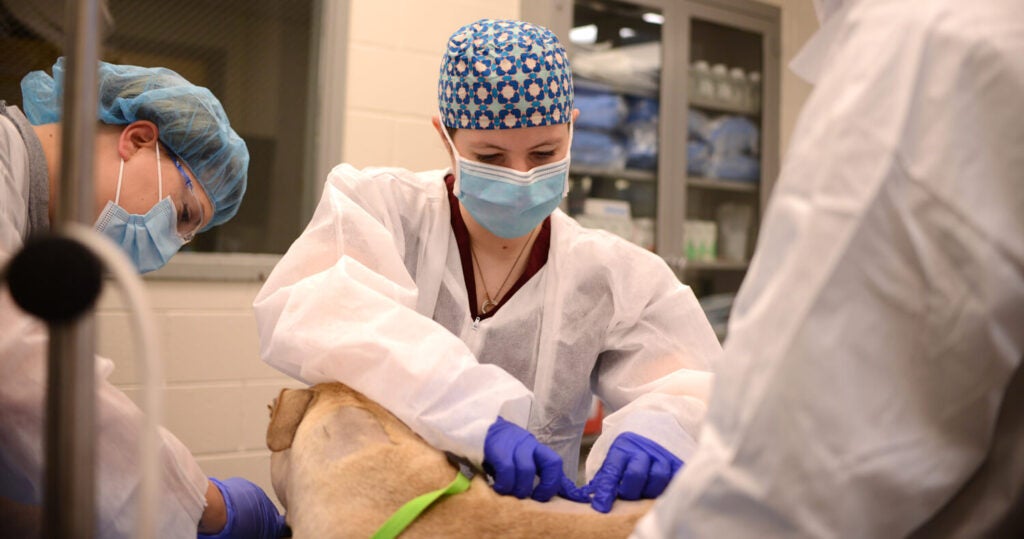Important Tips from Penn Vet to Keep Pets Safe During the Holidays

Faculty In This Story
Lisa Murphy, VMD, professor of toxicology, and Deborah Mandell, VMD, Service Head of the Emergency Service at Penn Vet’s Ryan Hospital, offer the following tips to keep pets healthy and out of the emergency room during the holidays.
Poisonous Holiday Plants
Poinsettias: Toxicity from poinsettias is often exaggerated. The thick sap inside the stem is toxic, but a healthy dog or cat that eats part of the plant will only display symptoms such as vomiting, lack of appetite, and depression. If a pet ingests part of a poinsettia, restrict food and water for a few hours. Symptoms should only last an hour or two. If they persist, pet owners should consult with their vet.
Mistletoe: Mistletoe berries are the most toxic part of the plant but are fairly mild in toxicity. If ingested, an animal will display symptoms such as vomiting, lack of appetite, and depression. The risk is dehydration. Pets that are very young or very old may require treatment.
Holly: Spines on holly leaves are sharp and can cause injury to the mouth, tongue, and lips. Holly also has some chemical content that is toxic. Eating the leaves or berries can cause vomiting and diarrhea, which may be more severe than symptoms caused by ingesting other holiday plants (such as poinsettias and mistletoe). Animals may also drool or foam at the mouth. Pet owners should gently rinse the animal’s mouth with water or provide water or milk for the pet to drink to soothe the mouth. If the pet will not eat or drink or is acting painful, pet owners should consult with their vet.
Yew: Yew is extremely toxic to pets. Though yew is not typically brought into the house, it is important to know that if ingested, all parts of this bush are incredibly cardiotoxic, except for the red fleshy portion of the fruit.
Lilies: Lily plants can be toxic to cats, causing kidney injury with potentially devastating, fatal effects. The toxic component of lilies is found in the leaves, flowers, and pollen. Pet owners should seek veterinary attention immediately if their cat has ingested any part of a lily plant.
Deck the Halls
Tinsel, wires, and lights for decorations, Christmas trees, and ornaments all pose potential pet problems.
Tinsel can cause vomiting and become a foreign body and obstruction requiring surgery if ingested.
Electric wires look especially appetizing to puppies and kittens. If they succeed in chewing them, they can suffer burns or shock that can cause seizures, loss of consciousness, and fluid build-up in the lungs. Watch the lights as well.
Glass ornaments and ornament hooks are hazardous because they break easily. A pet can ingest the splinters, cutting its mouth, esophagus, or intestines.
Christmas trees can be hazardous if they are not secured and tip over. The water at the bottom can also cause GI signs if pets drink it.
In addition, dough ornaments, because of high salt content, can cause vomiting, diarrhea, and in severe cases, seizures.
Good Gift Giving
Make sure you give gifts that the pets are allowed to have, that won’t end up causing vomiting, diarrhea, or worse, a foreign body obstruction requiring surgery.
Festive Foods
Pet owners should maintain their pet’s regular diet. Treats of turkey, ham, gravy, cookies, and other goodies can lead to gastrointestinal upsets such as diarrhea and vomiting, or a condition called pancreatitis, which can be life threatening.
Dispose of all bones carefully so that pets cannot get to them. Poultry bones can also cause GI upsets, pancreatitis, or worse, get lodged in your pet’s esophagus.
Guilty pleasures for humans, like chocolate and alcohol, can be toxic to pets. Chocolate can cause vomiting and diarrhea at lower amounts, and heart arrhythmias and hyperactivity to seizures at higher doses. Alcoholic beverages can also cause neurologic signs like coma. Yeast-containing bread dough can rapidly expand in the warm environment of the stomach and also produce alcohol as it ferments. Grapes, raisins, and the sugar substitute xylitol can be toxic to dogs, as well.
Be sure that everyone in your family, friends, and guests know and understand what your pets can and cannot consume.
In Case of Emergency
As with any potential emergency, immediate attention from a veterinarian is imperative. Penn Vet’s Emergency Service is open 24 hours a day, seven days a week, 365 days a year.
Penn Vet’s Ryan Hospital is the only institution in the country recognized as both as Level I Facility and a verified Veterinary Trauma Center.
The Emergency Service is staffed by an integrated team of board-certified specialists who attend to each patient’s emergency and critical care needs. Call 215-746-8911 or visit Ryan Hospital at 3900 Spruce Street.
Related News

The University of Pennsylvania School of Veterinary Medicine Announces Two New Associate Dean Appointments
The Gilbert S. Kahn Dean of Veterinary Medicine, Andrew M. Hoffman, DVM, DVSc, DACVIM, announced the appointment of two new associate deans at the School’s veterinary hospitals. These new appointments…

Penn Vet New Bolton Center, Royal Veterinary College Launch New MARS EQUESTRIAN™ Veterinary Scholarship Program for Equine Research
The University of Pennsylvania’s School of Veterinary Medicine (Penn Vet) – together with the Royal Veterinary College (RVC) and MARS EQUESTRIAN™ – has launched a new, international scholarship program aimed…

People Behind the Surgeries and the Lifesaving Procedures They Love
Surgeons, animals, owners — and two complex surgeries with joyful results
About Penn Vet
Ranked among the top ten veterinary schools worldwide, the University of Pennsylvania School of Veterinary Medicine (Penn Vet) is a global leader in veterinary education, research, and clinical care. Founded in 1884, Penn Vet is the first veterinary school developed in association with a medical school. The school is a proud member of the One Health initiative, linking human, animal, and environmental health.
Penn Vet serves a diverse population of animals at its two campuses, which include extensive diagnostic and research laboratories. Ryan Hospital in Philadelphia provides care for dogs, cats, and other domestic/companion animals, handling more than 30,000 patient visits a year. New Bolton Center, Penn Vet’s large-animal hospital on nearly 700 acres in rural Kennett Square, PA, cares for horses and livestock/farm animals. The hospital handles more than 6,300 patient visits a year, while our Field Services have gone out on more than 5,500 farm service calls, treating some 22,400 patients at local farms. In addition, New Bolton Center’s campus includes a swine center, working dairy, and poultry unit that provide valuable research for the agriculture industry.


